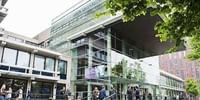Therefore, you?ll become a biologist, chemist, mathematician, etc. that can reflect on the implications of scientific results and can give advice on how to turn this knowledge into practical use for policymaking or communication purposes. This reflection will not just be scientific; you?ll also learn how to detect the philosophical, political and ethical side of issues. You?ll make scientists familiar with social perceptions as much as you?ll be advising governments and businesses or informing the general public.
This intermediary role is highly sought after and will prepare you for a dynamic career in various fields and work environments such as policy, advisory bodies, interest groups and governments, as well as interdisciplinary research that connects science and society. Although not part of the compulsory part of the programme, this specialisation can also prepare you for the field of science journalism or communication, for you can make that the focus of your graduation project.
Why study at ?- You?ll further deepen your knowledge in your scientific field in the first year and then learn to connect scientific knowledge with divergent perspectives and interests of various stakeholders in your second year.
- This specialisation is closely connected to the?Institute for Science, Innovation & Society?(ISIS); this institute brings together a group of experts from various disciplines and backgrounds in order to jointly tackle societal issues.
- You get to take classes with students from all natural and computer scientific fields.
- You?ll get to work in positions that deal with complex real-world issues while still being able to closely enjoy the wonders of scientific research.
Want to know more?
Would you like to learn more about this programme and Radboud University? Join us for our Master?s Open Day on 16 March 2019! To learn more and register for this exciting event, visit www.ru.nl/masters/openday.





